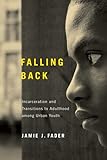Falling Back : Incarceration and Transitions to Adulthood among Urban Youth / Jamie J. Fader.
Material type: TextSeries: Critical Issues in Crime and SocietyPublisher: New Brunswick, NJ : Rutgers University Press, [2013]Copyright date: ©2013Description: 1 online resource (278 p.)Content type:
TextSeries: Critical Issues in Crime and SocietyPublisher: New Brunswick, NJ : Rutgers University Press, [2013]Copyright date: ©2013Description: 1 online resource (278 p.)Content type: - 9780813560748
- 9780813560755
- 365 .420974811 23
- HV9106.P5 F33 2013
- HV9106.P5 F33 2013eb
- online - DeGruyter
- Issued also in print.
| Item type | Current library | Call number | URL | Status | Notes | Barcode | |
|---|---|---|---|---|---|---|---|
 eBook
eBook
|
Biblioteca "Angelicum" Pont. Univ. S.Tommaso d'Aquino Nuvola online | online - DeGruyter (Browse shelf(Opens below)) | Online access | Not for loan (Accesso limitato) | Accesso per gli utenti autorizzati / Access for authorized users | (dgr)9780813560755 |
Browsing Biblioteca "Angelicum" Pont. Univ. S.Tommaso d'Aquino shelves, Shelving location: Nuvola online Close shelf browser (Hides shelf browser)

|

|

|

|

|

|

|
||
| online - DeGruyter The Case That Never Dies : The Lindbergh Kidnapping / | online - DeGruyter The Circassian Genocide / | online - DeGruyter Zapotecs on the Move : Cultural, Social, and Political Processes in Transnational Perspective / | online - DeGruyter Falling Back : Incarceration and Transitions to Adulthood among Urban Youth / | online - DeGruyter Do Babies Matter? : Gender and Family in the Ivory Tower / | online - DeGruyter Domestic Negotiations : Gender, Nation, and Self-Fashioning in US Mexicana and Chicana Literature and Art / | online - DeGruyter Structural Intimacies : Sexual Stories in the Black AIDS Epidemic / |
Frontmatter -- Contents -- Preface -- Acknowledgments -- Introduction -- 1. No Love for the Brothers: Youth Incarceration and Reentry in Philadelphia -- 2. "Because That Is the Way You Are": Predictions of Failure and Cultural Assaults Inside Mountain Ridge Academy -- 3. "You Can Take Me Outta the 'Hood, But You Can't Take the 'Hood Outta Me": The Experience of "Reform" at Mountain Ridge Academy -- 4. "Nothing's Changed but Me": Reintegration Plans Meet the Inner City -- 5. "I'm Not a Mama's Boy, I'm My Own Boy": Employment, Hustling, and Adulthood -- 6. "I Just Wanna See a Part of Me That's Never Been Bad": Family, Fatherhood, and Further Offending -- 7. "I'm Finally Becoming the Person I Always Wanted to Be": Masculine Identity, Social Support, and Falling Back -- 8. "I Got Some Unfinished Business": Fictions of Success at Mountain Ridge Academy's Graduation Ceremony -- Conclusion -- Notes -- Index -- About the Author
restricted access online access with authorization star
http://purl.org/coar/access_right/c_16ec
Jamie J. Fader documents the transition to adulthood for a particularly vulnerable population: young inner-city men of color who have, by the age of eighteen, already been imprisoned. How, she asks, do such precariously situated youth become adult men? What are the sources of change in their lives? Falling Back is based on over three years of ethnographic research with black and Latino males on the cusp of adulthood and incarcerated at a rural reform school designed to address "criminal thinking errors" among juvenile drug offenders. Fader observed these young men as they transitioned back to their urban Philadelphia neighborhoods, resuming their daily lives and struggling to adopt adult masculine roles. This in-depth ethnographic approach allowed her to portray the complexities of human decision-making as these men strove to "fall back," or avoid reoffending, and become productive adults. Her work makes a unique contribution to sociological understandings of the transitions to adulthood, urban social inequality, prisoner reentry, and desistance from offending.
Issued also in print.
Mode of access: Internet via World Wide Web.
In English.
Description based on online resource; title from PDF title page (publisher's Web site, viewed 30. Aug 2021)


